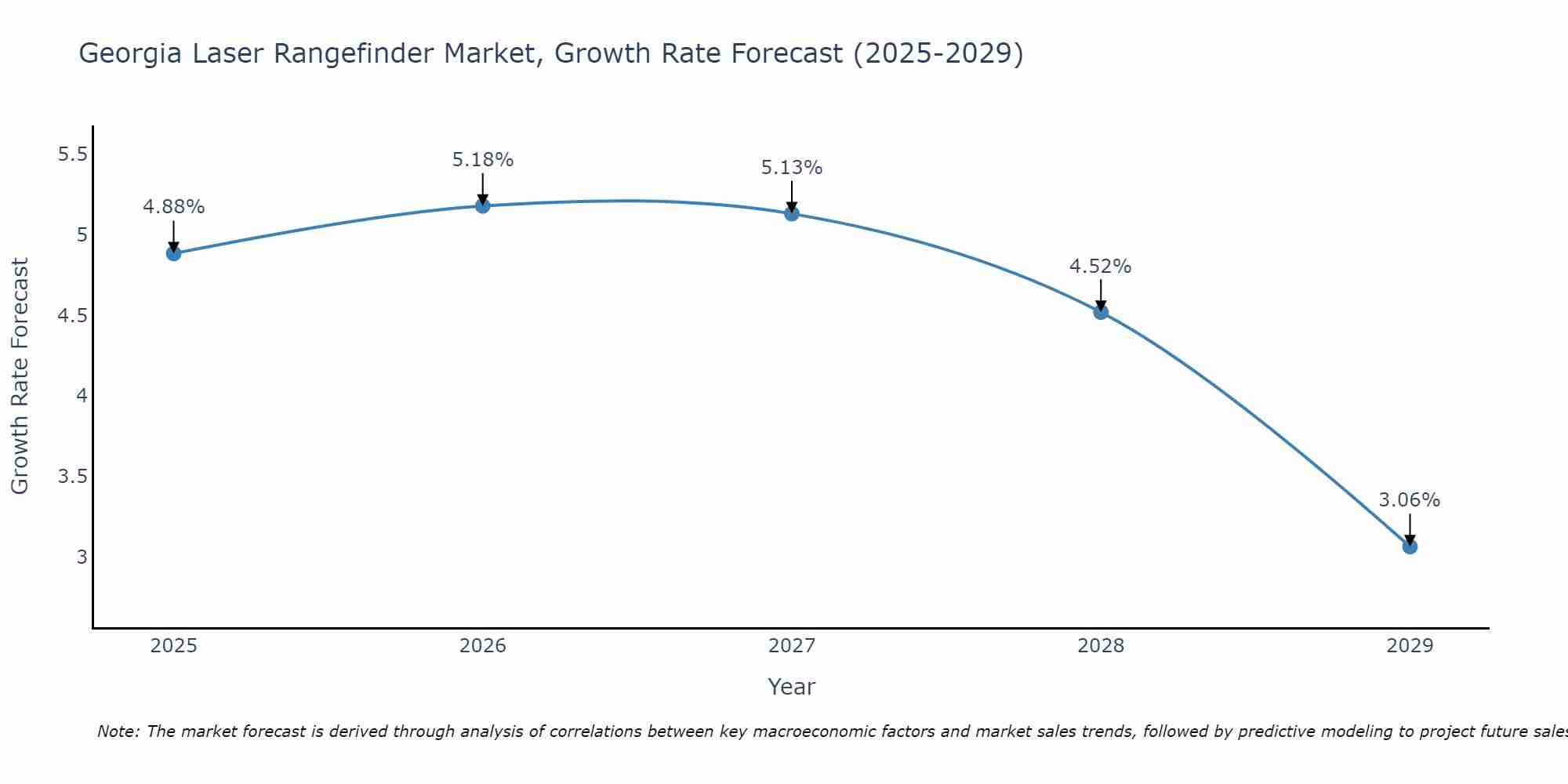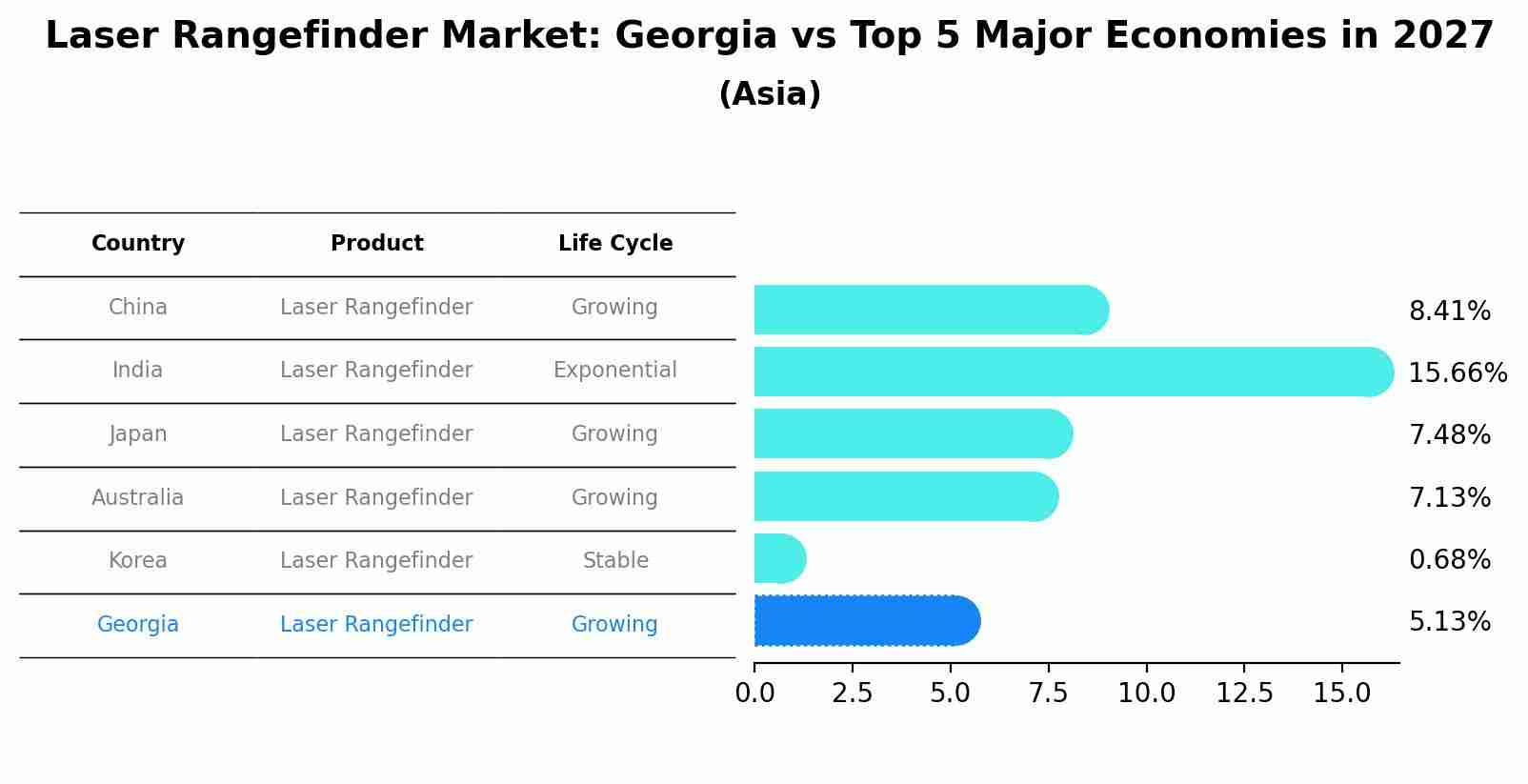Georgia Laser Rangefinder Market Outlook | Trends, Companies, Forecast, Analysis, Value, Industry, Size, COVID-19 IMPACT, Growth, Share & Revenue
| Product Code: ETC366000 | Publication Date: Aug 2022 | Updated Date: Aug 2025 | Product Type: Market Research Report | |
| Publisher: 6Wresearch | No. of Pages: 75 | No. of Figures: 35 | No. of Tables: 20 | |
Georgia Laser Rangefinder Market Size Growth Rate
The Georgia Laser Rangefinder Market is projected to witness mixed growth rate patterns during 2025 to 2029. Starting at 4.88% in 2025, the market peaks at 5.18% in 2026, and settles at 3.06% by 2029.

Laser Rangefinder Market: Georgia vs Top 5 Major Economies in 2027 (Asia)
By 2027, Georgia's Laser Rangefinder market is forecasted to achieve a growing growth rate of 5.13%, with China leading the Asia region, followed by India, Japan, Australia and South Korea.

Georgia Laser Rangefinder Market Overview
The Georgia laser rangefinder market is experiencing robust growth driven by the expanding defense, hunting, sports, and outdoor recreational activities in the region. Laser rangefinders utilize laser technology to accurately measure distances to targets, objects, or landmarks, catering to various applications such as surveying, mapping, shooting, and wildlife observation. The market is propelled by technological advancements, such as long-range capabilities, target tracking, and integrated sensors, enhancing the performance and versatility of laser rangefinder devices. Key players in the Georgia laser rangefinder market are focusing on product innovation, ruggedness, and affordability to meet the evolving needs of military, law enforcement, and civilian users and gain a competitive advantage in the market.
Drivers of the market
The Georgia laser rangefinder market is propelled by increasing applications in military, defense, hunting, and surveying. Laser rangefinders offer accurate distance measurement capabilities, enabling target acquisition, reconnaissance, and surveillance in military and law enforcement operations. Moreover, advancements in laser rangefinder technology, such as longer ranges, faster measurement speeds, and compact designs, are expanding their utility and driving market growth in Georgia.
Challenges of the market
The laser rangefinder market in Georgia faces challenges such as limited military budgets for procurement, competition from alternative ranging technologies, and regulatory hurdles for export controls. Technological advancements and performance requirements further impact market dynamics.
Government Policy of the market
The government of Georgia has recognized the strategic importance of laser rangefinders in defense, aerospace, and surveying applications, leading to the formulation of supportive policies to bolster the laser rangefinder market. Understanding the diverse applications and technological advancements in laser rangefinders, the government has implemented measures to support research, development, and production of rangefinding technologies. These include research grants, tax incentives for manufacturers, and regulations to ensure product quality and safety. Additionally, the government has focused on fostering collaboration between industry stakeholders and research institutions to drive innovation and competitiveness in the market. By leveraging these policies and initiatives, the government aims to position Georgia as a hub for laser rangefinder technology development and production, driving economic growth and job creation in the state.
Key Highlights of the Report:
- Georgia Laser Rangefinder Market Outlook
- Market Size of Georgia Laser Rangefinder Market, 2021
- Forecast of Georgia Laser Rangefinder Market, 2028
- Historical Data and Forecast of Georgia Laser Rangefinder Revenues & Volume for the Period 2018 - 2028
- Georgia Laser Rangefinder Market Trend Evolution
- Georgia Laser Rangefinder Market Drivers and Challenges
- Georgia Laser Rangefinder Price Trends
- Georgia Laser Rangefinder Porter's Five Forces
- Georgia Laser Rangefinder Industry Life Cycle
- Historical Data and Forecast of Georgia Laser Rangefinder Market Revenues & Volume By Type for the Period 2018 - 2028
- Historical Data and Forecast of Georgia Laser Rangefinder Market Revenues & Volume By Telescope Later Rangefinder for the Period 2018 - 2028
- Historical Data and Forecast of Georgia Laser Rangefinder Market Revenues & Volume By Hand-held Later Rangefinder for the Period 2018 - 2028
- Historical Data and Forecast of Georgia Laser Rangefinder Market Revenues & Volume By Application for the Period 2018 - 2028
- Historical Data and Forecast of Georgia Laser Rangefinder Market Revenues & Volume By Military for the Period 2018 - 2028
- Historical Data and Forecast of Georgia Laser Rangefinder Market Revenues & Volume By Construction for the Period 2018 - 2028
- Historical Data and Forecast of Georgia Laser Rangefinder Market Revenues & Volume By Industrial for the Period 2018 - 2028
- Historical Data and Forecast of Georgia Laser Rangefinder Market Revenues & Volume By Sports for the Period 2018 - 2028
- Historical Data and Forecast of Georgia Laser Rangefinder Market Revenues & Volume By Forestry for the Period 2018 - 2028
- Historical Data and Forecast of Georgia Laser Rangefinder Market Revenues & Volume By Others for the Period 2018 - 2028
- Georgia Laser Rangefinder Import Export Trade Statistics
- Market Opportunity Assessment By Type
- Market Opportunity Assessment By Application
- Georgia Laser Rangefinder Top Companies Market Share
- Georgia Laser Rangefinder Competitive Benchmarking By Technical and Operational Parameters
- Georgia Laser Rangefinder Company Profiles
- Georgia Laser Rangefinder Key Strategic Recommendations
Frequently Asked Questions About the Market Study (FAQs):
- Single User License$ 1,995
- Department License$ 2,400
- Site License$ 3,120
- Global License$ 3,795
Search
Related Reports
- ASEAN and Thailand Brain Health Supplements Market (2025-2031) | Strategy, Consumer Insights, Analysis, Investment Trends, Opportunities, Growth, Size, Share, Industry, Revenue, Segments, Value, Segmentation, Supply, Forecast, Restraints, Outlook, Competition, Drivers, Trends, Demand, Pricing Analysis, Competitive, Strategic Insights, Companies, Challenges
- ASEAN Bearings Market (2025-2031) | Strategy, Consumer Insights, Analysis, Investment Trends, Opportunities, Growth, Size, Share, Industry, Revenue, Segments, Value, Segmentation, Supply, Forecast, Restraints, Outlook, Competition, Drivers, Trends, Demand, Pricing Analysis, Competitive, Strategic Insights, Companies, Challenges
- Europe Flooring Market (2025-2031) | Outlook, Share, Industry, Trends, Forecast, Companies, Revenue, Size, Analysis, Growth & Value
- Saudi Arabia Manlift Market (2025-2031) | Outlook, Size, Growth, Trends, Companies, Industry, Revenue, Value, Share, Forecast & Analysis
- Uganda Excavator, Crane, and Wheel Loaders Market (2025-2031) | Strategy, Consumer Insights, Analysis, Investment Trends, Opportunities, Growth, Size, Share, Industry, Revenue, Segments, Value, Segmentation, Supply, Forecast, Restraints, Outlook, Competition, Drivers, Trends, Demand, Pricing Analysis, Competitive, Strategic Insights, Companies, Challenges
- Rwanda Excavator, Crane, and Wheel Loaders Market (2025-2031) | Strategy, Consumer Insights, Analysis, Investment Trends, Opportunities, Growth, Size, Share, Industry, Revenue, Segments, Value, Segmentation, Supply, Forecast, Restraints, Outlook, Competition, Drivers, Trends, Demand, Pricing Analysis, Competitive, Strategic Insights, Companies, Challenges
- Kenya Excavator, Crane, and Wheel Loaders Market (2025-2031) | Strategy, Consumer Insights, Analysis, Investment Trends, Opportunities, Growth, Size, Share, Industry, Revenue, Segments, Value, Segmentation, Supply, Forecast, Restraints, Outlook, Competition, Drivers, Trends, Demand, Pricing Analysis, Competitive, Strategic Insights, Companies, Challenges
- Angola Excavator, Crane, and Wheel Loaders Market (2025-2031) | Strategy, Consumer Insights, Analysis, Investment Trends, Opportunities, Growth, Size, Share, Industry, Revenue, Segments, Value, Segmentation, Supply, Forecast, Restraints, Outlook, Competition, Drivers, Trends, Demand, Pricing Analysis, Competitive, Strategic Insights, Companies, Challenges
- Israel Intelligent Transport System Market (2025-2031) | Strategy, Consumer Insights, Analysis, Investment Trends, Opportunities, Growth, Size, Share, Industry, Revenue, Segments, Value, Segmentation, Supply, Forecast, Restraints, Outlook, Competition, Drivers, Trends, Demand, Pricing Analysis, Competitive, Strategic Insights, Companies, Challenges
- Uganda Precast and Aggregate Market (2025-2031) | Strategy, Consumer Insights, Analysis, Investment Trends, Opportunities, Growth, Size, Share, Industry, Revenue, Segments, Value, Segmentation, Supply, Forecast, Restraints, Outlook, Competition, Drivers, Trends, Demand, Pricing Analysis, Competitive, Strategic Insights, Companies, Challenges
Industry Events and Analyst Meet
Our Clients
Whitepaper
- Middle East & Africa Commercial Security Market Click here to view more.
- Middle East & Africa Fire Safety Systems & Equipment Market Click here to view more.
- GCC Drone Market Click here to view more.
- Middle East Lighting Fixture Market Click here to view more.
- GCC Physical & Perimeter Security Market Click here to view more.
6WResearch In News
- Doha a strategic location for EV manufacturing hub: IPA Qatar
- Demand for luxury TVs surging in the GCC, says Samsung
- Empowering Growth: The Thriving Journey of Bangladesh’s Cable Industry
- Demand for luxury TVs surging in the GCC, says Samsung
- Video call with a traditional healer? Once unthinkable, it’s now common in South Africa
- Intelligent Buildings To Smooth GCC’s Path To Net Zero













